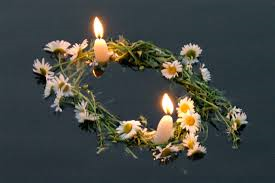
The Wianki Festival of Wreaths is held on June 23 in Washington, D.C. every year. The observance originates from Poland, where the word wianki means "wreaths" in Polish. Polish-American girls on St. John's Eve (June 23) make wreaths out of fresh greens, put a lit candle in the center and set them afloat in the reflecting pool in front of the Lincoln Memorial.
Then the young men will gather around the pool, hoping that the wind will blow their girlfriend's wreath towards them.
The origin of this festival is traced back to pagan times. For hundreds of years, it has been customary in Poland for the girls to wear a garland of wildflowers on St. John's Eve, decorate it with ribbons and fasten a lighted candle to the center. Then they would throw their wreaths far out into a moving river or stream. The outcome goes like this:
1. If the wreath drifts to shore, it is taken as a sign that the girl will never marry.
2. If the wreath sinks she will die within the year.
3. If the wreath floats downstream, she will definitely be married.
Now, according to superstitious legend, the boy who catches a wreath will marry the girl to whom it belongs. So the boys hide in the boats along the river banks and try to capture their sweetheart's garlands. At the end of the festival, the boys take the girls upstream in their boats. (What they do, well....)
A festival similiar to this took place in pre-Revolutionary Russia, known as Semik, which means "seventh." This festival took place on the 7th Thursday after Easter. The custom involved young girls throwing wreaths into the water or hanging them on trees as an offering to the god of the woods. The fate of the wreath was regarded as the young girl's fate.
Why the wreaths? The wreath in general is known to symbolize immortality, victory and mourning. The myrtle wreath is the traditional symbol of a bride. The wreaths that the young Polish and Polish-American girls set afloat on the water are therefore symbols of several different paths their lives may take. In other words, they may die within the year, they could marry, they could...etc.